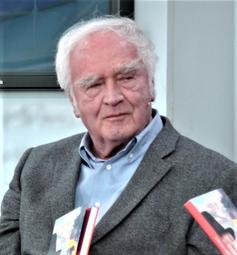 |
|
| Martin Walser | |
Martin Walser, considered one of the pillars of postwar German literature, along with Günter Grass, Heinrich Böll, and Siegfried Lenz, died on July 28 at age 96.
German president Frank-Walter Steinmeier called Walser a "world-class" writer whose novels, short stories, plays, and essays opened the eyes of many people "most of all about the country... and the time in which they live."
The focus of his many works was in particular on West Germany in the 1950s and '60s. Walser said that he preferred to write about characters considered "losers." He once said, "I think that world literature is about losers. That's just the way it is. From Antigone to Josef K.--there are no winners, no champions. And furthermore, anyone can confirm that in their circle of acquaintances: People are always more interesting when they are losing than when they are winning."
His first novel was Ehen in Philippsburg (The Gadarene Club in English), which appeared in 1957 and is "a satirical portrait of West German postwar society at the time of so-called Economic Miracle," as Deutsche Welle put it. The book won the Hermann Hesse Prize. His bestselling book was A Runaway Horse, published in 1978, which many critics considered "Walser's most beautiful and mature book and a masterful, searing critique of society."
Walser provoked a lot of controversy over the years. When he won the Peace Prize of the German Book Trade in 1998, in his acceptance speech during the Frankfurt Book Fair, he decried "the permanent show" of "our historical burden, the never ending shame" of the Holocaust. "Auschwitz is not suitable for becoming a routine-of-threat, an always available intimidation or a moral club or also just an obligation," he said. "What is produced by ritualisation has the quality of a lip service." Soon after, Ignatz Bubis, the president of the Central Council of Jews in Germany, accused Walser of "intellectual arson" and said Walser was "trying to block out history or, respectively, to eliminate the remembrance." The two met and reconciled, but the speech remained controversial for many.
Then in 2002, Walser, who loathed negative criticism of his work, published Death of a Critic, a thinly disguised novel about the critic he disliked most, Marcel Reich-Ranicki, who was Germany's best known literary critic for many years. The book emphasized that the critic was Jewish; many thought the portrayal antisemitic.
Reich-Ranicki later told Der Spiegel: "I don't think that [Walser] is an anti-Semite. But it is important to him to demonstrate that the critic, who allegedly tortured him most, is a Jew, too. He expects his public to follow him in this. You see, there never was an anti-Semitic line or remark from Grass, not one. And I certainly haven't written only positively about his books."

